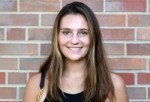Senior Grant Colvin clicks through his World Oceans flashcards on Quizlet, starring each term he misses. Colvin is working to memorize what he can from the preparation packet provided for the Academic World Quest.
They are only given four months until the local competition where students compete to answer the most questions about eight topics — from South Korea to world oceans to space — and Colvin and his three teammates are trying to study as much as they can.
The team was put together when Ms. Fishman was trying to find two juniors for last year. This year, the East team has seniors Grant Colvin and Kara Auvray and juniors Charlie Birt and Sophie Rice. The seniors are there to guide the juniors and help them prepare as much as possible — since they already have one year under their belt, they know the format of the competition.
“You just have to study as much as you can and hope that the 10 questions that they ask during the competition [are something] that you have read something about that,” Auvray said. “So it’s definitely nerve wrecking, because you are hoping that you have prepared enough.”
The random selection of topics — from global immigration to Germany — are split up into subtopics such as culture, religion and politics. They took the local competition test on Feb. 9 to qualify for nationals.
To qualify for nationals, they must place first place at the local competition. Nationals is held in D.C. and the top 200-300 students attend, but unfortunately East did not qualify this year.
At the competition, each team member is given a 10 page packet with 100 questions in multiple choice format. The questions are put up on the projector individually, with only 45 seconds to answer each one on a multiple choice paper shared between all four of them. Each team’s score is announced at the end of the competition. This year, East scored 67/100 — less than last year’s 73/100.
According to Colvin and Avuray, the competitiveness that arises is similar to a sports competition. Even though they study separately, they work together during the test — bringing them closer as a team.
“I really enjoy learning about the world,” Colvin said. “I have a map of the world up in my bedroom and it’s always been super intriguing to me growing up in Kansas, and I don’t get to travel internationally a lot, but it’s still something that interests me and I’m mostly interested in politics so it goes hand in hand especially with the competitiveness.”
When Colvin went into the competition last year, he was nervous and didn’t have any idea what to expect. After learning more about the format at last year’s competition, he felt more confident going into the competition this year.
According to Colvin, he and Auvray spread out the studying over four months last year. However, he choose a shorter route this year — doing a 15 hour long study session just a few nights before the competition.
“This year there was a general sense of procrastination, and we got second place this year by one point out of 100 which is tragic,” Colvin said. “But last year we won by one point, so it’s kind of poetic in a way.”
Although they didn’t make it to D.C. this year, they still won prizes — Royals tickets and a $50 dollar gift card for answering the bonus questions correctly. For the bonus points they had to go through three tie breaker questions — one being “how many people are affected by coronavirus today?”
Knowing random knowledge has made them more willing to research any questions they have about the world, and continue to keep up with current events.
“I still remember facts that I studied last year like global immigration and the refugee crisis,” Colvin said. “Then this year, I studied topics like the oceans, so obviously things that have lots of implications today I can speak from a position of knowledge.”
The local competitions are held by International Relations of Kansas City, where each school in the KC metro area and parts of Lawrence are allowed to send in a team.
Last year, East attended nationals in D.C. and competed against students all over the country. According to Colvin, they didn’t think they had a huge chance of winning, so they focused on living in the moment — and not caring what the score turnout would be.
“I just enjoy getting to learn about different topics that I probably have heard about briefly,” Auvray said. “But it really allows you to explore into different topics that you never would have really thought about.”
Related











![Sisters Evan and Lilah Platz have plenty of differences — Type A personality vs. Type B, two classes this semester vs. nine and buying new clothes vs. thrifting.
“I feel like I’ve picked up on a lot of what she does [over the years],” Lilah said. “And I would say we’re pretty similar [now]. The other day, my mom sent us a photo that was taken of both of us, and we’re doing the same head tilt, same smile, same everything.”
This year, their normal-sister bickering, movie nights, before-school car rides, competitive volleyball games near their childhood neighborhood Lake of the Forest and trips to the dog park will be coming to an end. The pair will be going to different places across the world.
To read more of this profile, click the link in bio.
#storybyaddynewman
#socialmediabymirandaliberda
#photobyleximadden](https://scontent-den2-1.cdninstagram.com/v/t51.75761-15/499259309_18508249885043606_6851628937687104474_n.jpg?stp=dst-jpg_e35_tt6&_nc_cat=103&ccb=1-7&_nc_sid=18de74&_nc_ohc=x6seY_mpJOEQ7kNvwFsAzun&_nc_oc=Adnbew10S26rr5sI2D-2XR7yllvExAxRxLefrwSd9D66roy1DF5jiTwQ3FLNGzp8-c0&_nc_zt=23&_nc_ht=scontent-den2-1.cdninstagram.com&edm=ANo9K5cEAAAA&_nc_gid=YdUIz7AWzMd7Fa8vTYoeDQ&oh=00_AfKkPlQKVrBUt9d2LDNCMlCdAsVF1kzEI5ufwxXgTO7y1w&oe=6838812E)




Leave a Reply